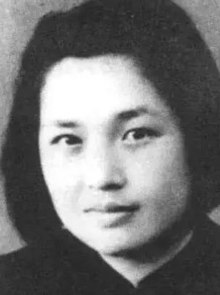
Zhu De was a Chinese general, military strategist, politician and revolutionary in the Chinese Communist Party (CCP).

Nie Rongzhen was a Marshal of the People's Republic of China. He died as the last People's Liberation Army (PLA) marshal.
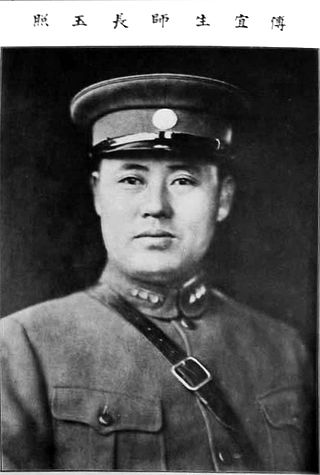
Fu Zuoyi was a Chinese military leader. He began his military career in the service of Yan Xishan, and he was widely praised for his defense of Suiyuan from the Japanese. During the final stages of the Chinese Civil War, Fu surrendered the large and strategic garrison around Beiping to Communist forces. He later served in the government of the People's Republic of China as Minister of the Hydraulic Ministry.

Mao Anying was a Chinese military officer. He was the eldest son of Mao Zedong and Yang Kaihui. Educated in Moscow and a veteran of multiple wars, Mao was killed in action by an air strike during the Korean War.
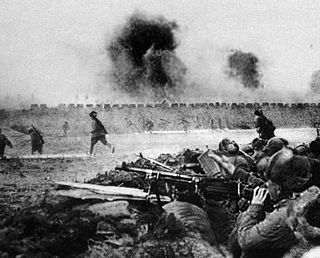
The Liaoshen campaign, an abbreviation of Liaoning–Shenyang campaign after the province of Liaoning and its Yuan directly administered capital city Shenyang, was the first of the three major military campaigns launched by the Communist People's Liberation Army (PLA) against the Kuomintang Nationalist government during the late stage of the Chinese Civil War. This engagement is also known to the Kuomintang as the Liaohsi campaign, and took place between September and November 1948, lasting a total of 52 days. The campaign ended after the Nationalist forces suffered sweeping defeats across Manchuria, losing the major cities of Jinzhou, Changchun, and eventually Shenyang in the process, leading to the capture of the whole of Manchuria by the Communist forces. The victory of the campaign resulted in the Communists achieving a strategic numerical advantage over the Nationalists for the first time in its history.

Ulanhu or Ulanfu, born Yun Ze, was the founding Chairman of China's Inner Mongolia Autonomous Region, serving from 1947 to 1966.

Beijing Nanyuan Airport(IATA: NAY, ICAO: ZBNY) was a People's Liberation Army Air Force Base and a secondary commercial airport of Beijing, the capital of China. Located in Fengtai District, 3 kilometres (1.9 mi) south of the 4th Ring Road and 13 km (8.1 mi) from Tiananmen Square, Nanyuan Airport was first opened in 1910, making it the oldest airport in China. It was the main operating base for China United Airlines, which was also the airport's sole airline.
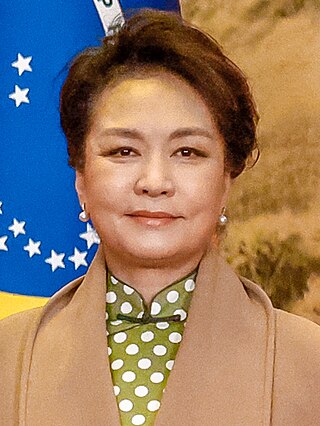
Peng Liyuan is a Chinese contemporary folk singer and the spouse of Xi Jinping, current General Secretary of the Chinese Communist Party and President of the People's Republic of China.
The 7th Central Committee of the Chinese Communist Party was in session from 1945 to 1956. It was a product of the convening of the 7th National Congress of the Chinese Communist Party. It held six plenary sessions in this 11-year period. It began in June 1945, before the end of the Second Sino-Japanese War, and the resumption of the Chinese Civil War. This committee would be succeeded by the 8th Central Committee.

Jodbajab, also known under the courtesy name of Shihai was an Inner Mongolian military officer and government official during the late Qing dynasty and Mengjiang governments. He was an ethnic Mongol belonging to the Plain and Bordered White Banner of Xilin Gol League.

Zeng Yike, also known as Yico Zeng or Yico Tseng, is a Chinese singer. She was a finalist on the Hunan TV talent show Super Girl in 2009. Later that year, on 18 December 2009, her first album Forever Road was released. It was suggested that a track "Leo" was similar to a song released in 2002 and she was accused of plagiarism. Zeng however denied the charge, saying all of her songs were original. In 2010 she appeared in the film Love in Disguise.

Zhang Yunyi, was a Communist revolutionary and military strategist of the People’s Republic of China. Born in Wenchang, Hainan, he joined the Chinese Communist Party in 1926, and took part in the Northern Expedition, the Nanchang Uprising, the Baise Uprising, the Second Sino-Japanese War and the Chinese Civil War. Zhang held the posts of the army commander of the 7th Red Army, the assistant staff officer of the Military Commission of the Central Committee of the CCP, the commander of a military area, etc., and was named one of the ten Senior Generals in 1955. The Zhang Yunyi Memorial Hall is located in Wenchang, Hainan Province.
The 5th National Congress of the Kuomintang was held from 12–23 November 1935, in Nanjing, China.

Beijing Daily is the official newspaper of the Beijing Municipal Committee of the Chinese Communist Party (CCP). Founded on October 1, 1952, it has since 2000 been owned by the Beijing Daily Group, which also runs eight other newspapers. It has a circulation of about 400,000 per day, making it one of the most widely circulated newspapers in the city.

A Hint of You is a 2013 Taiwanese romantic television series with a food theme produced by Sanlih E-Television, starring Michael Zhang, Nana Lee, Danson Tang, Demi Yin, Jay Shih, Cindy Song and Hans Zhang as the main cast. The Chinese title literally translates to "Taste of Missing You". Filming began on February 14, 2013 and completed on June 25, 2013, the drama was filmed as it aired. First original broadcast began on March 6, 2013 on SETTV, airing on weekdays from 9:00-10:00 pm, with the last of the 68 episodes aired on June 28, 2013. This is SETTV's last drama to air during its weekday 9:00-10:00 pm timeslot before it was obsoleted to air variety programs instead.

Qiu Huizuo was a lieutenant general of the People's Liberation Army (PLA), best known as one of the "four guardian warriors" of Vice Chairman Lin Biao during the Cultural Revolution. Qiu rose through the ranks of the PLA during the civil war between the Chinese Communist Party and the Kuomintang. He took charge as the PLA logistics chief in 1959, and was persecuted at the beginning of the Cultural Revolution. He was later rehabilitated owing to the blessing of Zhou Enlai and Lin Biao, and elevated to the Politburo of the Chinese Communist Party in 1969. In return, he helped to persecute Lin's enemies and consolidate Lin's power in the PLA. After Lin's flight and death in 1971, Qiu was purged and sentenced to 16 years in prison.
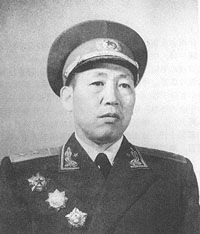
Wang Bingzhang was a Chinese Communist revolutionary and a founding lieutenant general of the People's Liberation Army (PLA). He joined the Northwest Army of the warlord Feng Yuxiang in 1929, before participating in the Ningdu uprising and defecting to the Communist Red Army in 1931. He fought in the Red Army's Long March, the Second Sino-Japanese War where he was credited with devising a trench warfare tactic that helped destroy enemy pillboxes, and the Chinese Civil War.
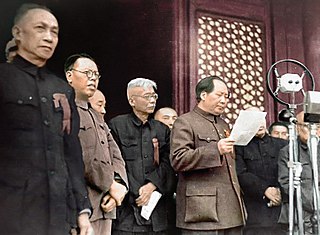
The proclamation of the People's Republic of China was made by Mao Zedong, the Chairman of the Chinese Communist Party (CCP), on October 1, 1949, in Tiananmen Square in Beijing. The government of a new state under the CCP, formally called the Central People's Government, was proclaimed by Mao at the ceremony, which marked the foundation of the People's Republic of China.

Medal of the Republic is a 2021 Chinese eight-part anthology biographical television series. The TV series follows the deeds of eight people who were awarded the Medals of the Republic.

Zhao Zhongrong, courtesy name Yongkuan, was a lieutenant general in the Army of the Republic of China. He was a native of Guo County, Shanxi Province. He graduated from the Law Department of Chaoyang University in Beijing and Sun Yat-sen University in Moscow. He served as the county magistrate of Baotou County and the founder of the Three People's Principles. Executive director of the Central Committee of the Youth League, director of the Peking Office of the 12th War Zone of the Anti-Japanese War, standing member of the Central Executive Committee of the Kuomintang, and member of the first legislative session after the implementation of the constitution. During the second civil war between the Kuomintang and the Communist Party, he was sent to monitor Fu Zuoyi. Fu Zuoyi After the rebellion, Zhao Zhongrong was imprisoned and shot at the Yongdingmen execution ground in Beijing on 25 March 1951.
